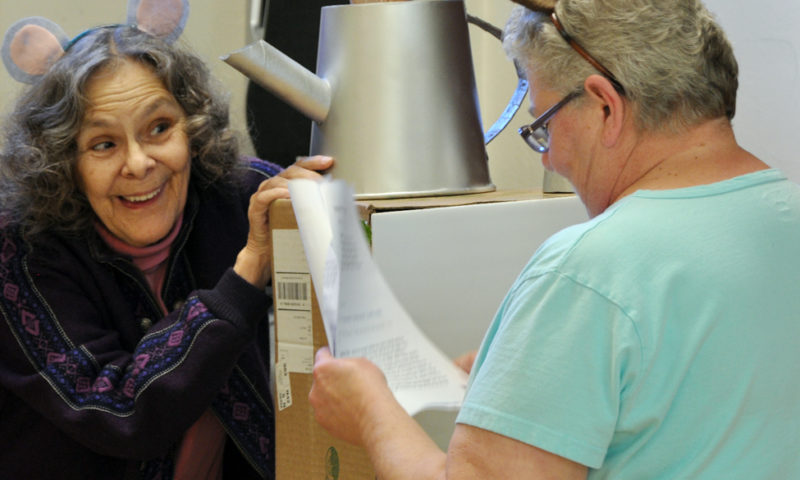Reader Theater hits it big at Lighthouse Activity Center

Julie Collins, a volunteer at Lighthouse Activity Center in Tacoma, is very excited about the new reader theater program she started at the center.
Collins, a retired nurse from Western State Hospital, said she had run the program at Western State as well, and the patients loved it. She was nearly moved to tears when a patient who was participating in Reader theater enjoyed it so much he said, “I finally did something right.â€
Seeing the positive results, Collins approached Michelle Williams, Lighthouse Activity Center Supervisor, with the idea of implementing the program there.
“It is an outlet for creative expression,†explained Williams, “a safe place for people to do that.â€
Seniors who participate in the program at Lighthouse are extremely enthusiastic about reading the plays and getting into the act. Clamoring for lead parts, they perform on a regular basis and have a large following of folks acting as the audience, an important part of the production.
Reader Theater is described as a dramatic presentation of written work in script form. Collins uses children’s stories and turns them into scripts, improvising to keep things inexpensive.
No memorization is required and costumes are not necessary, although the folks at Lighthouse like to bring items from home to enhance their performances.
Collins said they started out with four or five interested participants, and now there are 15 or 20. “This is the third time we’ve done it,†she said. “They are energetic and gung ho.â€
Reader Theater is used throughout grade schools to help students improve their reading skills, but at Lighthouse it gives adults a chance to act out, become more involved and release their inner child.
The focus is on reading the text with expressive voices and gestures. The actors at Lighthouse have that part down pat, using voice inflection and humor.
At a recent performance, Delores Forester played the part of a doctor and came equipped with a hat, a meat thermometer as a prop and band aids, which were actually gum, that she passed out to audience members.
“I was in drama in high school,†said Forester. “I like the human interaction. I’m sort of a drama queen.â€
The play the group read was “The Boy who was Followed Home,†adapted from a story written by Margaret Mahy.  Collins called the adaptation “The Man who was Followed Home.†The readers were anxious to perform as they trooped in holding props and stood in a child’s rubber swimming pool.
Loretta Okonek said she liked meeting new people and making new friends, and Hazel Nute said the play was “new and different. A lot of fun.â€
After the play, amid applause from the audience members, Collins said, “The production crew exceeded my expectations and provided all the props.â€
Collins enjoys the interaction as well and added, “We just laugh at our own silliness.â€
More Information: Being a ham is perfectly acceptable but if you don’t want to act, you can also be involved in staging, rehearsal and the performance. Reader’s Theater meets on Tuesdays from 12:45 to 2 p.m. Everyone is welcome. No acting experience necessary. Call Michele for more information 591-5080.
[nggallery id=6]


 Four years ago Tony McKennon moved to Washington state. Intent on writing and illustrating children’s books, McKennon said he saw the Tacoma area as a “great blend of urban and natural in close proximity.â€
Four years ago Tony McKennon moved to Washington state. Intent on writing and illustrating children’s books, McKennon said he saw the Tacoma area as a “great blend of urban and natural in close proximity.â€